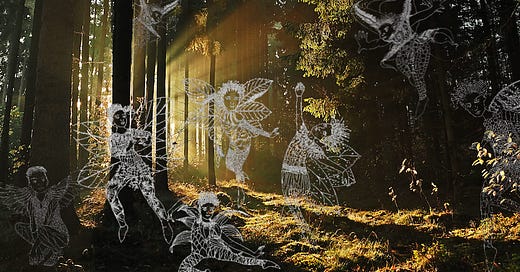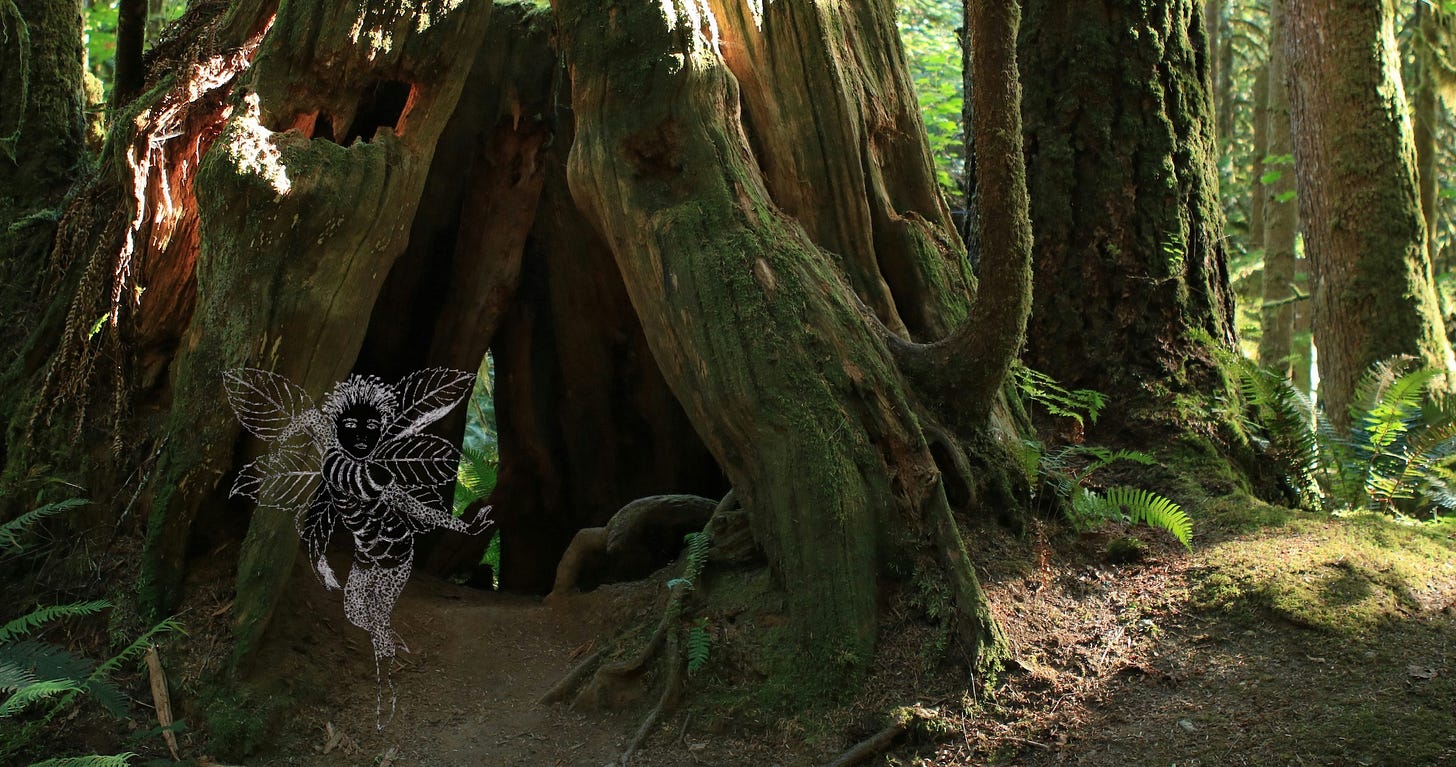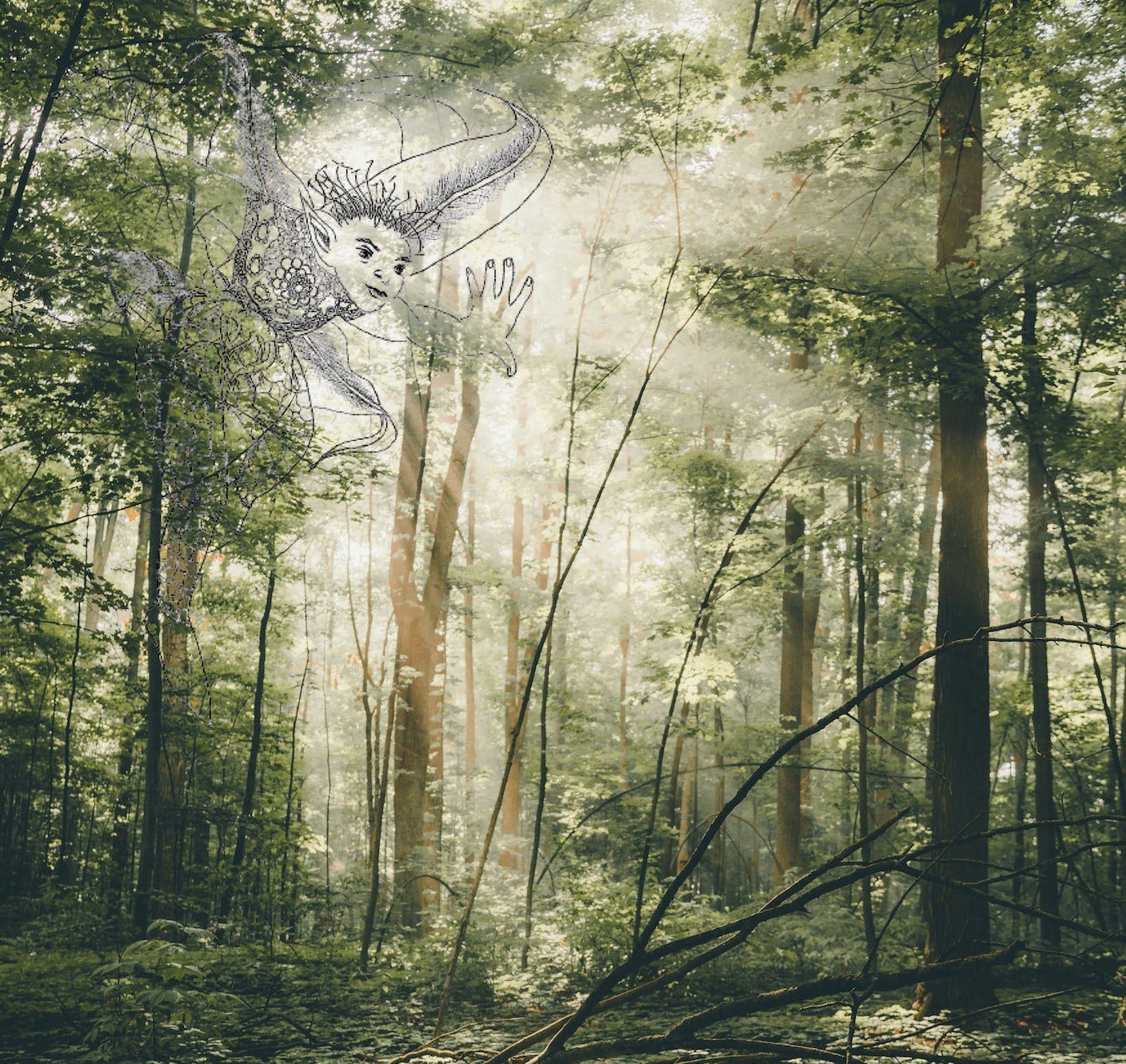Of course you don't believe in fairies.
You're fifteen.
You think I believed in fairies at fifteen?
Took me until I was at least a hundred and forty.
Hundred and fifty, maybe.
〰 Neil Gaiman 〰
The Spirits of Words
I believe in everything until it's disproved.
So I believe in fairies, the myths, dragons.
〰 John Lennon 〰
That witches and wizards use words to cast magic spells is well known. Lesser known is the fact ~ at least as true as the etymon in etymology, and arguably more original than the PIE system of W. J. jr.* ~ that words have fairies. (*see my wordcast Word Diggers and Poachers)
Being born and bred in human language, Word⚘Fairies are mostly earthbound creatures. Although they can fly too ~ sometimes. More often they move in a leapfrogging kind of way.
Soaring to greater heights is the exception. They can jump from one human to another. But not too far. At least that’s been true for spoken words, before the advent of podcasting, and webinaring, and chatting across the globe in the virtual noosphere generated in cyberspace.
When words are spoken directly from mouth to ear, their fairies move like grasshoppers ~ or dragonflies ~ or crickets. They flit around between humans. Fast and invisible.
With written words it's a whole other story, which may be told another time.
Like their relatives, the Plant Spirits and Dryads, Word⚘Fairies are shy creatures. Although born with human words, they don’t reveal themselves to every human... Especially when humans have an agenda to take over and manipulate the words they speak.
When human speakers (or writers) try to force an alien spirit into a verbiont ~ e.g. when we pressgang them into a behaviour, performance, or personality that doesn’t correspond with their true identity ~ such actions and intentions are considered barbaric in the wildwordwoods.
Needless to say, Word⚘Fairies don't respond well to the enslavement of their words. Their job is to help them live their own lives. To fulfill their true purpose and potential.
Our verbal symbionts have endured too much hocus-pocus and ponzi schemes over the centuries. Their spirit companions have figured out the treacherous ways of anthropoids by now.
Most words are far older than you or I. They've circled around the human world, giving expression to many cultures. They have been charged with the knowledge of human Consciousness over millennia. They know far more than our historians have betrayed and our memories can hold.
Anyway, the elusive creature we try to capture here in terms of a fay of human verbal expression doesn't play along with the rules of the Anthropocene. Word⚘Fairy is not just a morpheme, created by a human godlike mind, at the mercy of our goodwill or bad mouths.
She plays her own wordgames. She can easily disappear in the tangled web of wordroots, among the mycelium of verbiage. If you're a fairy born within a verbal symbiont, the best hiding places are the spaces beneath and between roots of words from a common ancestor.
Word⚘Fairies [from word › weird › wyrd = having the power to control fate + fairy › daughter of fate › fari = speak] are the guiding spirits of our verbal symbionts. You could say, they are the guardians of the indigenous nature and identity of a verbiont.
The guiding spirit / guardian of a verbiont may resonate with the meaning, definition, sense and intention piled into a word. Or they may not. Take for example the phrase ‘being economical with the truth’.
The honest and straightforward meaning of this phrase is ‘telling lies’. The intention behind such language is to cover up the fact that it is a lie. We call it euphemism [from Greek eu = good + pheme = speech].
But what does ‘euphemism’ really mean?
Let's find out…
Gaia's Scions and Spawn
Think of them as persons from the fairy wood.
〰 Stevie Smith 〰
In Greek mythology, Pheme is a daughter of Elpis (the goddess of Hope) and the personification of Fame. Elpis is a daughter of Nyx (goddess of the Night). Nyx is a daughter of Phanes (light bearer), and Phanes is the primordial son of Gaia & Hydros.
That makes Pheme (Fame) the granddaughter of Nyx (Night) and the greatgreatgranddaughter of Gaia (Earth) and Hydros (god of primordial waters).
Pheme is not a goddess but one of the daimonas ~ supernatural creatures with lesser powers than the gods and superior to humans. The ancient Greeks must have had at least a hundred or so daimones who could support them, or interfere with their lives, as the case may be.
If a mortal was in Pheme's good books, she would grant them a good reputation, popularity, and all the privileges connected with such a celebrity status.
In today’s language, Pheme would be the fairy godmother who could fulfil the wishes of every influencer on social media. She would make sure you get plenty of followers and your posts on your platforms go viral. Pheme would be the one to catapult you and your projects to stardom in cyberheaven.
But be careful what you wish for. The above listed propaganda only shows the sunny side of Pheme's repertoire. An irresistible urge to set tongues wagging courses through her veins.
If you mess up, this fair demigoddess can spell big trouble. In her darker mood she spreads gossip, which can ruin your reputation. Scandalmongering and Chinese whispers are her speciality. She is the chief executive of the rumour mill and head viniculturist of the grape vine.
According to the Roman poet Ovid, Fama (the Roman name for Pheme) lives right in the centre of the world, half way between heaven and earth, the land to one side, the sea to the other, in a spot equidistant from anywhere. Her home is a palatial tower made entirely of ore with a thousand windows, reverberating with all the scandalous news about illicit love affairs between mortals and gods and the like.
The ore palace doubles and redoubles every sound. Not a moment of stillness, ever. You can't catch a single word. Only murmuring, thrumming, a constant humdrum of voices. This becomes a breeding ground for credulousness, error, presumption, whispered hissing, which in turn nurtures suspicion and discord.
Some Greco-roman authors interpret Pheme as an evil spirit. Others are not so harsh. Her name also means 'speech' in Old Greek, and her role is basically to amplify every spoken word. If she turns up the volume of every hearsay and chatter, and if some of the talk isn't very flattering, it's not really her fault.
Eupheme, a daughter of one of the three Graces, is the daimona of praise and triumph. You could easily confuse these two spirits. We might think euphemism represents the good side of Pheme's nature, while dysphemism (= derogatoray speech) shows her bad side.
But that's not true. What we call 'euphemism' doesn't do justice to either of the two daimonas. There is nothing good about describing negative things, or situations, or behaviour with 'positive' words. 'Economical with the truth' still means betrayal, deception, lie. It can even mean perjury, or slander, depending on the context.
If you look at it from the perspective of the words 'economical' and 'truth', this so-called 'euphemism' is not just a lie. It's an abuse of two perfectly good words. It's identity theft. It's stealing an honest face and plastering it over the visage of some wicked bugger.
This kind of abuse of words doesn't go unnoticed in the wildwordwoods.
Word⚘Fairies are the offspring of Pheme and Eupheme and all the other daimones who have been around for millenia. Ultimately they are all descendants of Gaia, goddess of the earth.
No word born and bred in Gaia's symbiosphere is ever overlooked or ignored. Human speakers, writers, and spreaders of words might be unaware. Gaia and Pheme, however, don't miss a single chat. And they do care.
The Children of Pheme
Come away, O human child!
To the waters and the wild
With a færy, hand in hand,
For the world's more full of weeping than you can understand.
〰 William Butler Yeats 〰
In the Anthropocene, we think of Pheme and her siblings as myths of the ancient Greeks. And myth, in Anthropocene language, translates into 'old folk tales' or 'widely held but false beliefs'.
The ancient Greek word mythos μύθος translates into 'word, talk, tale, giving an account of events.' There is no association with 'falseness' in the original version. Later on, when the word mythos was first adopted in European languages, it took on the meaning of an 'ancient story'.
If you look at it that way, Mythos [= myth] is almost synonymous with Pheme [= fame]. Both represent words coming out of the mouth.
In the Symbiocene, we continue to use words to speak, write, chat online, tell stories and communicate in many ways. Therefore the concepts of Pheme and Mythos are still valid. Only the baggage, with which both words are weighed down, are no longer suitable.
In symbiocentric language all words have to be fully fledged symbionts. They need to carry their own weight. That weight has to be the right one, it has to be truly theirs. They have to fulfil their potential and represent their true identity. In other words, they must be free to be themselves.
That's why we need Word⚘Fairies. They help us breed and nurture new words for the Symbiocene, and for the discipline of Synchronosophy.
Many of our Word⚘Fairies ~ born and bred in the wildwordwoods of Symbiopædia ~ are direct descendants of Pheme.
So far no myths have been told, or rumours spread, about any children of Pheme. But we'll have a word with her and let you know in the next wordcast.








“Words- They know far more than our historians have betrayed and our memories can hold.”
Yes so true! Thank you for setting these verbionts free! Undressing them to their naked essence and authenticity! Now we know the real story 🙏❤️
What a beautiful and surprising post. It seems more and more people are realizing the truth of this, in their own way.